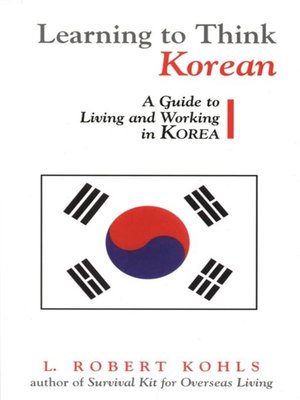
Sign up to save your library
With an OverDrive account, you can save your favorite libraries for at-a-glance information about availability. Find out more about OverDrive accounts.
Find this title in Libby, the library reading app by OverDrive.



Search for a digital library with this title
Title found at these libraries:
| Library Name | Distance |
|---|---|
| Loading... |
The definitive guide to understanding Korea - from home to work and those cultural destinations in between.
Kohls shares a feast of Korean culture: a ricebowl of history and tradition complemented by an array of spicy tidbits that capture the reader's attention like a mouthful of kimchi. Based on personal experience, he provides critical incidents that explore the more puzzling aspects of Korean culture. Kohls explores Korean values - traditional values, value changes over the past forty years and projected values for the early decades of the twenty-first century. He is equally insightful when it comes to discussing the cultural patterns and practices of the workplace. He takes on management style, personal issues, networking and "pull" negotiating style, persistence, key Korean business relations and more.
To a greater extent than most other Asian countries, Korea adheres to the traditional collectivist and Confucian traits of harmony, hierarchy, ingroups/outgroups, status, and proper behavior. According to Kohls, these traits plus the more Westernized values of the younger generations and the veneer of modern urban savvy surface in surprising combinations in personal and workplace relationships - often where they are least expected.
Kohls shares a feast of Korean culture: a ricebowl of history and tradition complemented by an array of spicy tidbits that capture the reader's attention like a mouthful of kimchi. Based on personal experience, he provides critical incidents that explore the more puzzling aspects of Korean culture. Kohls explores Korean values - traditional values, value changes over the past forty years and projected values for the early decades of the twenty-first century. He is equally insightful when it comes to discussing the cultural patterns and practices of the workplace. He takes on management style, personal issues, networking and "pull" negotiating style, persistence, key Korean business relations and more.
To a greater extent than most other Asian countries, Korea adheres to the traditional collectivist and Confucian traits of harmony, hierarchy, ingroups/outgroups, status, and proper behavior. According to Kohls, these traits plus the more Westernized values of the younger generations and the veneer of modern urban savvy surface in surprising combinations in personal and workplace relationships - often where they are least expected.







